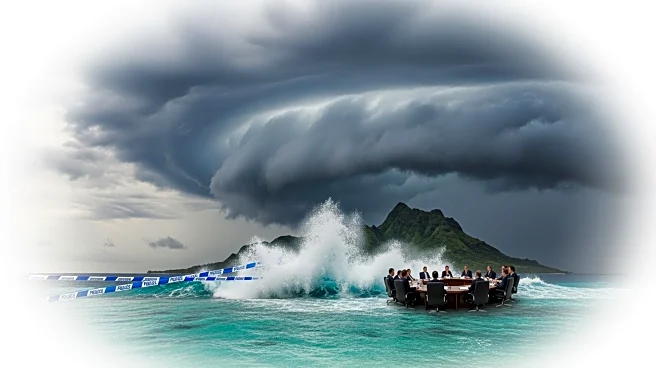What's Happening?
Hurricane Melissa, a Category 4 storm, is poised to make landfall in Jamaica, bringing potentially catastrophic impacts. The National Hurricane Center has issued urgent warnings for residents to seek shelter
as the storm approaches with maximum sustained winds near 150 mph. The hurricane is expected to cause life-threatening flash flooding and landslides due to damaging winds and heavy rainfall. Jamaica is the first in line to experience the storm's impact, followed by Haiti, the Dominican Republic, and Eastern Cuba. The Southeast Bahamas and the Turks and Caicos are also on alert for storm surges and heavy rainfall.
Why It's Important?
The arrival of Hurricane Melissa poses significant risks to the Caribbean region, particularly Jamaica, which is expected to face severe weather conditions. The potential for flash flooding and landslides could lead to substantial infrastructure damage and loss of life. The economic impact on these regions could be profound, affecting tourism, agriculture, and local economies. Emergency services and disaster response teams are likely to be stretched thin, and the recovery process could be lengthy and costly. The storm's trajectory also threatens other Caribbean nations, which may face similar challenges in the coming days.
What's Next?
As Hurricane Melissa approaches, emergency response teams in Jamaica and neighboring countries are preparing for immediate action. The focus will be on evacuation efforts, securing infrastructure, and providing aid to affected areas. The National Hurricane Center will continue to monitor the storm's path and intensity, providing updates to ensure public safety. Governments in the region may need to coordinate international aid and support to manage the aftermath of the storm. Long-term recovery plans will be essential to rebuild and restore affected communities.
Beyond the Headlines
The impact of Hurricane Melissa highlights the increasing frequency and intensity of extreme weather events in the Caribbean, potentially linked to climate change. This situation underscores the need for improved disaster preparedness and resilient infrastructure in vulnerable regions. The storm may also prompt discussions on climate policy and international cooperation to address the challenges posed by such natural disasters.









